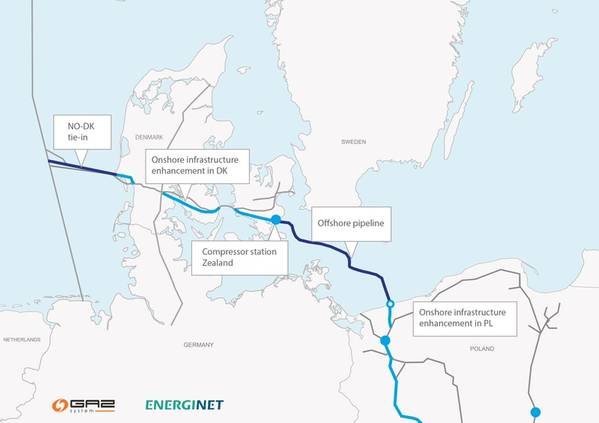
Maritime analytics and data company GateHouse Maritime has won a contract with the Polish gas transmission system operator GAZ-SYSTEMS, to monitor traffic near the Baltic Pipe Project offshore pipeline in the Baltic Sea, making sure that vessels do not accidentally damage it.
Baltic Pipe is a strategic EU infrastructure project led by Danish and Polish companies to build a gas pipeline from the Norwegian part of the North Sea to Denmark and Poland.
The GateHouse Maritime contract concerns the Baltic Sea offshore pipeline with an estimated length of 275 km. The pipeline will be in operation during 2022. When finished the Baltic Pipe will be a crucial part of both Denmark’s and Poland’s gas infrastructure systems providing households with direct access to the Norwegian gas fields.
As part of the 5-year contract, GateHouse Maritime will provide data analytics to automate monitoring of the new gas pipeline in the Baltic Sea.
"In relation to the Baltic Pipe Project, GateHouse Maritime will now provide data analytics tools to enhance the maritime security in the area surrounding the pipeline. The data tool set is part of the GateHouse Maritime Ocean Visibility offerings; an immense data set processed by AI and machine learning which can analyze vessel traffic, detect and predict events and document incidents," GateHouse Maritime said.
VP Commercial at GateHouse Maritime, Martin Dommerby Kristiansen said: "First of all, we are pleased to win a contract of this caliber. The Baltic Pipe project is a significant part of both Danish and Polish energy infrastructure, and our solution can warn and thus prevent vessels from potentially damaging activities in the area, such as bottom trawling or anchoring which will minimize the risk of damages on the pipeline."
Based on data and insight, the solution will increase awareness in and around the designated surveillance zone and automatically warn vessels that get too close to the pipeline while GAZ-SYSTEMS will also be notified, Martin Dommerby Kristiansen explains.
Despite regulation of maritime traffic around pipeline structures as well as clear markings on navigational charts, damages caused by vessels still occur. This has paved the way for more reliable surveillance solutions in which maritime data plays a crucial role, GateHouse Maritime said.
"With a solid data foundation, automated monitoring and alarms eliminate the need for manual surveillance as well as human errors or oversight. Furthermore, we detect patterns in the maritime data that can enable reports of near-miss situations which can be used to highlight areas that are of potential risk and prevent damages in the future, says Martin Dommerby Kristiansen.